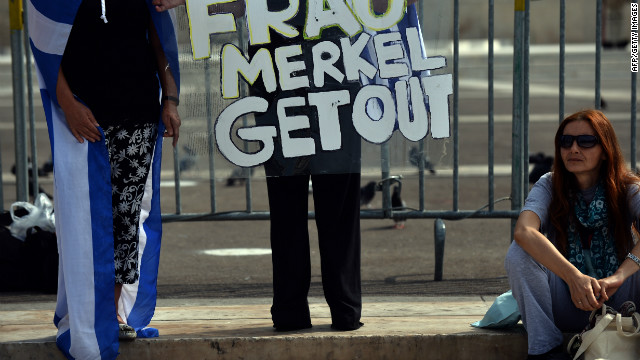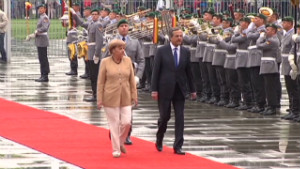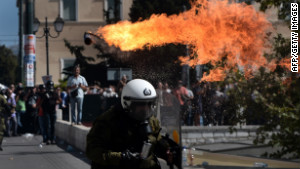
- Greece is facing heavy austerity cuts to meet international bailout conditions
- Police in Athens are ready for protests at a visit by German leader Angela Merkel
- Critics see Merkel as the main enforcer of EU-imposed austerity measures
- As of May 2012, 53.8% of Greeks younger than 25 were unemployed
Athens, Greece (CNN) -- Greek authorities were braced for protests Tuesday as German Chancellor Angela Merkel visited a country where many view her as the cause of their suffering.
Labor unions and Syriza, the radical-left opposition party, are planning demonstrations in Athens outside parliament, where the German leader is due to arrive, despite police banning protests. Merkel will meet with Greek Prime Minister Antonis Samaras during her six-hour visit.
Critics see Merkel as the main enforcer of the EU-imposed austerity measures that have left a large number of Greeks unemployed and streaming to soup kitchens for a hot meal.
Before her visit, Merkel told CNN that she knows the austerity measures have been hard on some.
"It's very bitter obviously, sacrifices need to be made," Merkel said. "But I think these are necessary measures that have to be taken, I think it was not easy for anyone to impose those measures on them but these, I think, have been made on the background of great experience."
 Greece fears unrest during Merkel visit
Greece fears unrest during Merkel visit  Greece budget help: Lease media center
Greece budget help: Lease media center  Anger in Athens over austerity
Anger in Athens over austerity In return for international bailout funds, Greece has agreed to the austerity program and labor market reforms -- measures that have led to violent street demonstrations in the past.
The Greek government is seeking new ways to implement budget cuts of 11.5 billion euros ($14.49 billion) to ensure the country receives another international bailout installment later this month.
To comply with the belt-tightening measures, salaries have been cut for many workers, pensions and benefits have been slashed and unemployment rates have soared.
As of May 2012, 53.8% of Greeks younger than 25 were unemployed, according to Eurostat, the statistics division of the European Commission.
One woman stopped in Athens and asked about her feelings about Merkel's visit voiced her frustration. "To come and do what? Why should she come? They should just get rid of her and all the rest of them with her."
But Rafael Voulgarakis, a university student, welcomed her. "It is clearly positive, because as we know Germany is the largest power in Europe at the moment and one of the largest powers in the world," he said. "It is clear that the support of Ms. Merkel is good for our country and is needed."
German Foreign Minister Guido Westerwelle told Bild newspaper last week that Greece deserves "fairness and respect." He suggested that Merkel's visit represents a show of eurozone solidarity between those nations which are fiscally healthy and those that are debt-ridden and battling with savage cuts and social unrest.
Christoph Weil, a senior economist at Commerzbank, told CNN that Merkel's visit to Athens comes as a "surprise" and that there was "a significant risk that Greece will exit the euro in the next two years."
However Wolfango Piccoli, director of Eurasia Group, says the risk of a Greek exit from the eurozone remains "marginal" at the moment and that the Troika will provide Greece with the next tranche of bailout funds to meet its debt obligations.
But Piccoli warns that Greece will have to undergo stringent austerity measures before creditors will release any funds. He told CNN: "The vast majority will come from an additional round of cuts to wages and pensions. It's going to be almost 8 billion euros of the 13.5 billion euros coming from that. The total cut is 11.5 billion euros and then 2 billion euros of additional taxes."
On Monday, the Eurogroup -- a meeting of eurozone finance ministers -- convened in Luxembourg to give the green light to the European Stability Mechanism, the 17-nation currency bloc's permanent bailout fund.
Spain is expected to be the first country to make a request for financial aid from the ESM.
CNN's Elinda Labropoulou contributed to this report.


